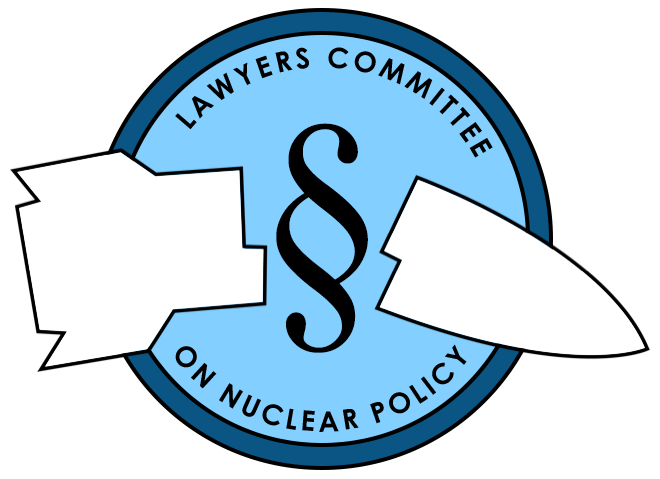U.S. Nuclear Weapons Policy Violates the Right to Life
SUBMISSION FOR THE UN HUMAN RIGHTS COUNCIL UNIVERSAL PERIODIC REVIEW, 36TH SESSION OF THE UPR WORKING GROUP, APRIL - MAY 2020
Submitted 3 October 2019 by:
LAWYERS COMMITTEE ON NUCLEAR POLICY
lcnp.org; johnburroughs@lcnp.org
220 E. 49th St., New York, NY 10017 USA +1 (212) 818-1861
Founded in 1981, LCNP is a non-profit educational association of lawyers and legal scholars that engages in research and advocacy in support of the global elimination of nuclear weapons and a more just and peaceful world through respect for domestic and international law.
Joining in this submission:
WESTERN STATES LEGAL FOUNDATION
wslfweb.org
655 13th Street, Suite 201, Oakland, CA 94612 USA
Founded in 1982, WSLF is a nonprofit organization that seeks to abolish nuclear weapons as an essential step in making possible a more secure, just, and environmentally sustainable world. Grounded in commitments to nonviolence and international law, WSLF provides independent information and analysis to a wide range of audiences.
SWISS LAWYERS FOR NUCLEAR DISARMAMENT
safna.org
Founded in 2014, SLND encourages all efforts towards general and complete disarmament, in particular nuclear disarmament.
A. Threat or Use of Nuclear Weapons
1. In paragraph 66 of General Comment No. 36 on the right to life set out in Article 6 of the International Covenant on Civil and Political Rights (ICCPR), the United Nations Human Rights Committee stated in part: “The threat or use of weapons of mass destruction, in particular nuclear weapons, which are indiscriminate in effect and are of a nature to cause destruction of human life on a catastrophic scale, is incompatible with respect for the right to life and may amount to a crime under international law.” Under the ICCPR, Article 4, the right to life is non-derogable, to be observed in all circumstances, even in the event of a “public emergency which threatens the life of the nation.” The United States of America is a state party to the ICCPR.
2. United States doctrine regarding use of nuclear weapons is not in conformity with the ICCPR right to life as applied by the committee.
3. The most recent US Nuclear Posture Review (NPR), released in February 2018, states: “There now exists an unprecedented range and mix of threat, including major conventional, chemical, biological, nuclear, space, and cyber threats, and violent nonstate actors.” And it says: “Potential adversaries must recognize that across the emerging range of threats and contexts: 1) the United States is able to identify them and hold them accountable for acts of aggression, including new forms of aggression; 2) we will defeat non-nuclear strategic attacks … [T]he United States will maintain the range of flexible nuclear capabilities needed to ensure that nuclear or non-nuclear aggression … will fail to achieve its objectives and carry with it the credible risk of intolerable consequences for potential adversaries now and in the future.”
4. The NPR thus underlines and expands the role of nuclear weapons beyond that of possible response to a nuclear attack by affirmatively identifying circumstances in which they could be used, namely in response to “non-nuclear strategic attacks.” This change increases the risks of nuclear war. For example, hard-to-attribute apparent cyber attacks will be considered a possible reason to resort to nuclear weapons, a change that will be all the more risky if other nuclear powers emulate US policy.
5. Signals that the United States will or may resort to nuclear weapons in certain circumstances are not confined to doctrinal statements. In a speech at the United Nations on 19 September 2017, US President Donald Trump stated: “The United States has great strength and patience, but if it is forced to defend itself or its allies, we will have no choice but to totally destroy North Korea.” The reference to total destruction, like President Trump’s earlier reference to unleashing “fire and fury like the world has never seen”, signals the possibility of use of nuclear arms.
6. The NPR asserts in passing that the “conduct of nuclear operations would adhere to the law of armed conflict.” A 2013 Pentagon Report on Nuclear Employment Strategy stated that all plans for use of nuclear weapons must “for instance, apply the principles of distinction and proportionality and seek to minimize the collateral damage to civilian populations and civilian objects.” In public appearances in November 2017, the present and preceding commanders of Strategic Command stated that orders to use nuclear weapons in violation of the law of armed conflict would be refused. The truth is that nuclear weapons cannot be used in compliance with that law, above all because their massive indiscriminate effects make it impossible to distinguish between military targets and civilian populations and infrastructure. That includes a circumstance of response to a prior nuclear attack.
7. That truth was recognized by the UN Human Rights Committee in its General Comment. It was also recognized by the Treaty on the Prohibition of Nuclear Weapons adopted at the United Nations by 122 states on 7 July 2017 (not yet entered into force). The treaty’s preamble reaffirms the need for all states to comply with applicable international law, including international humanitarian law and international human rights law. It recites rules and principles of international humanitarian law, and states: “Considering that any use of nuclear weapons would be contrary to the rules of international law applicable in armed conflict, in particular the principles and rules of international humanitarian law.” The preamble also reaffirms that “any use of nuclear weapons would also be abhorrent to the principles of humanity and the dictates of public conscience” – factors with legal as well as moral value.
Continue reading here.

